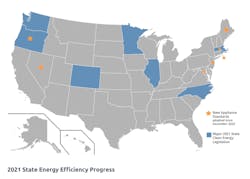Report: Electrification on rise as U.S. states escalate climate action
According to a new report by the American Council for an Energy-Efficient Economy (ACEEE), to aid recovery from the COVID-19 pandemic and meet climate goals, states accelerated clean energy efforts last year, partly with ambitious new laws to decarbonize their economies with an increasing emphasis on electrification.
The ACEEE's State Energy Efficiency Scorecard: 2021 Progress Report shows that several states passed laws in 2021 that incentivize fuel switching, which includes switching from fossil-fueled heating to efficient electric heat pumps. Such state laws—in Illinois, Colorado, Massachusetts, and Minnesota—encourage electrification that can curb energy use and emissions.
“As states emerged from the early months of the pandemic, they turned to electrification and energy-saving standards to help address the growing urgency of the climate crisis,” said Weston Berg, senior researcher at ACEEE and lead author of the report, which is presented as an interim update to ACEEE’s annual State Scorecard.
Berg says the depth of the crisis was underscored by extreme weather disasters last year—a February storm in Texas and an unprecedented Pacific Northwest heat wave in June—that caused large-scale power outages and casualties.
He continued, “States such as Massachusetts are adopting promising new laws that can reduce harmful pollution and create thousands of clean energy jobs, but they need to vigilantly implement them." Berg noted that unfortunate recent decisions in Arizona and New Hampshire have put energy-saving efforts at risk.
The good news: the 2021 federal infrastructure bill will offer states robust funding for efficiency and other clean energy measures.
New energy efficiency standards take hold
As the map above shows, some states included new or more stringent energy-saving standards for appliances and equipment in their clean energy laws. Other states adopted these standards as stand-alone measures. States also pushed to reduce energy waste with stricter efficiency standards for vehicles and buildings.
As directly stated by ACEEE, new energy efficiency standards have included:
- Appliance standards: "States were particularly active in setting efficiency standards for products. New state laws in DC, Maine, Massachusetts, Nevada, Oregon, and Rhode Island will require minimum energy and water use efficiency levels for more than 15 types of products, including air purifiers, computers, and restaurant equipment. In January, New Jersey signed into law new standards for 17 types of products. Massachusetts passed the first standards for EV chargers, and Nevada became the first state to adopt standards for gas fireplaces and air purifiers."
- Fuel economy: "While the federal government dragged its feet, states took action to improve the fuel economy standards for passenger cars and light trucks. Virginia, Washington, Nevada, New Mexico, and Minnesota moved to adopt California’s clean car rules, including its low-emission vehicle regulations and zero-emission vehicle (ZEV) program. Virginia passed HB 1965, making it the 15th state to adopt California’s ZEV program."
- Building codes: "States advanced more-efficient building energy codes, many coinciding with long-term goals to establish 'net-zero-energy' codes and strengthen incentives for all-electric construction. Many states across the U.S. South, though, have sought to stymie these efforts by adopting prohibitions on gas bans and electrification codes."
As further noted by ACEEE:
States adopting or implementing the 2018 International Energy Conservation Code (IECC) in 2021 included Hawaii and Virginia. The new 2021 IECC, which the U.S. Department of Energy (DOE) has determined provides a 9.4% improvement in energy savings relative to the previous code, is also under review in many states, including Connecticut, Delaware, Illinois, Maryland, Massachusetts, New Jersey, New York, Vermont, Washington, and Wisconsin, as well as the District of Columbia.
In addition, Illinois and Massachusetts passed legislation calling for new high-performance stretch codes, which require stricter efficiency than base codes, and Colorado became the second state, after Washington, to adopt a building energy performance standard for large buildings. Such a standard, a critical step for addressing energy waste in existing construction, requires buildings to meet performance targets by improving over time.
Finally, ACEEE admits that the COVID-19 pandemic has resulted in lingering disruptions to the energy efficiency industry, especially during the first half of 2020, that have slowed overall progress.
The Council adds, "As a result, the amount of power saved by ratepayer-funded electric efficiency programs dipped 1.1% nationwide in 2020, from 26.9 million megawatt-hours (MWh) in 2019 to 26.6 million MWh. Of course, the impact varied across states, which took different approaches to addressing the pandemic."
Notwithstanding, despite COVID’s overall impact, ACEEE notes that states can now tap new and unprecedented federal funding to advance their efforts.
As pointed out by the Council, "Last year, after months of negotiations, Congress reached an agreement on a $1 trillion infrastructure bill signed by President Biden in mid-November. The bill includes $3.5 billion for weatherizing homes of low-income households; more than $1 billion for building energy codes, new revolving loan funds supporting commercial building and home upgrades, public school and federal building upgrades, and worker training; $7.5 billion for installation of EV chargers; and millions more for industrial energy efficiency."

